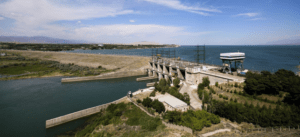By: The Republic Of Tajikistan Embassy
The strain on water resources is increasing globally due to rapidly growing demands and climate change. Sustainable management and sensible use of water could reduce some of that pressure, but expedient actions towards improvement of existing practices are lagging.
Meeting the water requirements of a growing world population is largely associated with the need for water to grow food, together with access to safe water supply and sanitation getting increased recognition as an essential element contributing to public health, which became even more evident in the wake of the Covid-19 crisis. The shortage of clean drinking water – a current challenge for populations across the globe, is not a pure function of the physical scarcity of water. A combination of factors, such as “business as usual” practices in the use, management and pollution of water in many places around the world undermine the achievement of poverty eradication, posing a threat to human well-being, economic growth and national security. Furthermore, climate change is exacerbating water security, by contributing to increasing variability in water cycles, thus inducing extreme weather events (floods, droughts), altering regimens of rainfall and intermittent streams, plus reducing the predictability of water availability, diminishing water quality and effectively threatening social, economic and environmental achievements worldwide with an increasingly adverse impact on demographic and migration patterns.

Today, humanity is still grappling with the Covid-19 crisis, which requires rethinking of the value of water as an elemental resource, as water, sanitation and hygiene (WASH) become essential to combat such public health threats. In the Shared Responsibility, Global Solidarity: Responding to the Socio Economic Impacts of Covid-19 report, the United Nations Secretary General points out that more than 50 percent of the world’s rural population and more than 20 percent of the urban inhabitants lack adequate health care coverage. This is while 2.2 billion people lack access to water and 4.2 billion have little or no basic sanitation, thus being deprived of frequent handwashing, which is the most basic and effective preventative measure against many viral and communicable diseases. The Covid-19 crisis has brought forth the urgency to ensure sustainable access to basic handwashing for the 40 percent of the world’s population currently with no access to water and sanitation, who are among the poorest and the most vulnerable.
To bridge the progress gap, the United Nations has launched the SDG (Social Development Goal) 6 Global Acceleration Framework. The Framework initiative emphasizes that there are many examples from around the world which prove that dramatic gains are possible and that some of the solutions are economical, effective and can be quickly deployed. The Framework initiative aims at delivering fast results at an increased scale. Coordinated by UN-Water, this initiative is determined by country demand and unifies the international community’s support for countries in need to achieve SDG 6. Action by the Framework initiative is driven by five accelerators: financing, data and information, capacity development, innovation, and governance.
Mobilizing political will and commitment to address water issues worldwide plays a crucial role. Equally important are forward-thinking competency and a willingness to promote innovative ways to approach local, national, regional and international water cooperation in the aftermath of the Covid-19 crisis. Open discussions about the issues shaping water resources management today and public participation in decision-making, including, among others, involvement of women, youth, minorities, migrants, refugees and persons with disabilities, can stimulate cooperative solutions and actions. Promoting a culture of consultation and dialogue, increasing participatory engagement and partnership will further help to deliver benefits for all.
Tajikistan global water initiatives
The problem of access to water is increasingly growing in today’s rapidly changing world. Today’s global challenges, particularly climate change and population growth make the situation even more alarming. Meanwhile, water is a powerful tool for cooperation and dialogue in support of sustainable development and promotion of safer and more resilient societies. There is, however, a need for more effective, integrated and coordinated actions, coupled with strong political will to address current shortcomings. All stakeholders, including those in government, international organizations, civil society, the private sector and academia, should be engaged in this effort, paying special attention to the livelihoods of poor and vulnerable people and leaving no one behind.
The Republic of Tajikistan, on the basis of a proper understanding of the growing water problems, as well as the importance of water resources for sustainable development, actively and consistently promotes the importance of water on the global agenda. Tajikistan possesses significant reserves of water resources and is a supporter of equitable and sustainable use of water through regional and international cooperation and believes that consistent promotion of water cooperation diplomacy is the only tool to solve problems in this area. From its deep involvement in spearheading global water initiatives, it is evident that water has a special place in the foreign policy concept of the Republic of Tajikistan. In this regard, Tajikistan implements the right to use of water resources based on whole regional interests, and built on the principles of good neighborliness, respect and mutual benefit as well as dialogue and cooperation for solving existing problems. (The Concept of Foreign Policy of the Republic of Tajikistan, 2015)
Since 2000, the Republic of Tajikistan has initiated the adoption of 6 UN General Assembly resolutions aimed at addressing water related issues. These initiatives have made a worthy contribution to a better understanding of the importance of water at a global level and given a high priority to addressing it for socio‐economic development, environmental sustainability, peace and stability, and overall viable development.
Under its motto of “Turn Water into Cooperation” Tajikistan further advocates water issues on the regional and global agenda and solicits governments, UN agencies, international organizations, NGOs and other stakeholders for their support in order to ensure water security for future generations.
In recent years, the President of the Republic of Tajikistan has taken several initiatives at international levels within the UN with regard to the importance of water at global levels:
- Proclamation of 2003 as the International Year of Fresh Water, proposed during the 54th session of the UN General Assembly (October 1, 1999). Based on this initiative during the 55th Session of the UN General Assembly the year 2003 was declared as the International Year of Fresh Water and the International Forum on fresh water was held in Dushanbe (29 August – 1 September 2003).
- Initiative of the President of the Republic of Tajikistan on the proclamation of 2005-2015 International Decade for Action “Water for Life”. In accordance with the Dushanbe Declaration on December 23, 2003, the UN General Assembly adopted a resolution and declared 2005-2015 the International Decade for Action “Water for Life”.
- Declaration of the year 2013 as the International Year of Water Cooperation. In 2013 the international community recognized the UN General Assembly Resolution 67/204 on the International Year of Water Cooperation initiated by the Republic of Tajikistan. On February 11, 2013, the ceremony of announcing the International Year of Water Cooperation was held at UNESCO Headquarters in Paris, in which the Minister of Foreign Affairs of the Republic of Tajikistan took part and addressed the gathering.
- Proposal of the President of the Republic of Tajikistan to announce 2018 – 2028 years as the International Decade for Action, “Water for Sustainable Development”. On December 21, 2016, the UN General Assembly adopted the relevant resolution and declared 2018-2028 the International Decade for Action, “Water for Sustainable Development”. This initiative was originally put forward by the Leader of Peace and National Unity – the Leader of the Nation, the President of the Republic of Tajikistan on April 12, 2015, at the World Water Forum in Daegu, Republic of Korea.
In June 2018 following the official launch of the Decade for Action in New York on the day of World Water Day (22 March) a High-Level International Conference on the implementation of the International Decade for Action, “Water for Sustainable Development, 2018-2028” was held on 20-22 June 2018 in Dushanbe with the participation of high-level representatives of the UN member states, international and regional organizations and other interested parties. During this Conference, a wide range of issues related to water resources was considered. The results of the Conference gave a new impetus to the process of fulfilling the goals of the above-mentioned decade. In addition, the Dushanbe Conference, which took place on the eve of the next meeting of the United Nations High-level Political Forum on Sustainable Development (July 9-18, 2018), which addressed the Sixth Goal of Sustainable Development, became a timely and important basis for the development of specific recommendations to strengthen measures on the achievement of water-related goals and objectives. At the end of the Conference its resulting document – Dushanbe Declaration – was adopted.
Iran-Qatar Chamber of Commerce Shares the Latest on IranQatar Trade & the World Cup 2022
Water Action Decade and the Dushanbe Water Process

In December 2016, the United Nations General Assembly declared the 2018-2028 period as the International Decade for Action “Water for Sustainable Development” (hereinafter Water Action Decade). This declaration aims at supporting sustainable development and integrated management of water resources, while promoting cooperation and partnerships to support achieving internationally agreed water-related goals and targets, including those contained in the 2030 Agenda for Sustainable Development. On 22 March 2018, the United Nations Secretary General’s Plan for the Water Action Decade was released during a High-Level Launch Event, convened by the President of the 73rd United Nations General Assembly. The plan outlined ongoing activities and capabilities of the UN system and international organizations and the operational setup envisaged to support Member States in the implementation of the Water Action Decade.
In this connection, the Government of Tajikistan, with its commitment to continue providing a platform for policy dialogue, partnership and action at the global, regional and national levels, is organizing high-level international conferences throughout the Water Action Decade with the support of the United Nations and other partners,. This series of events constitutes the so-called “Dushanbe Water Process”. As part of this process, the First High-level International Conference on the International Decade for Action, “Water for Sustainable Development”, 2018-2028 (First Dushanbe Water Action Decade Conference) was held in Dushanbe on 20-21 June 2018. The outcome of the Conference included recommendations to the UN High-level Political Forum on Sustainable Development with an in-depth review of the implementation of Sustainable Development Goals – SDG 6. The Final Declaration of the First Dushanbe Conference confirmed the focus of the next conference to be on “Catalyzing water action and partnership at the local, national, regional and global levels” to achieve the goals of the Water Action Decade and other water-related SDGs and targets. In the wake of the Covid-19 pandemics, the Second Dushanbe Water Action Decade Conference had to be postponed to June 2022. Taking into account the rapidly evolving development challenges, and the fact that the coronavirus disease demonstrated the crucial role of safe and affordable drinking water, and adequate and equitable sanitation and hygiene which should be available, accessible, and affordable to all, as well as the importance of water for economic recovery, the Conference planned for 2022 will have a renewed focus on its intended targets for the water-smart recovery path in the post-Covid world.
Iran and Brazil Celebrate 120 Years of Friendship
The importance at global level of the 2022 Second Dushanbe Water Action Decade Conference was further reaffirmed through the adopted UN GA resolution 75/212, declaring it as the key preparatory event for the United Nations Conference on the Midterm Comprehensive Review of the Implementation of the Objectives of the International Decade for Action “Water for Sustainable Development”, 2018-2028. The Midterm Review Conference will take place from 22 to 24 March 2023 in New York and will be co-hosted by the Governments of Tajikistan and the Netherlands. UN GA resolution 75/212 calls on the offer of the Government of Tajikistan to use the Dushanbe Water Action Decade Conference in 2022 as a platform to support an effective preparation for the Midterm Comprehensive Review. The Conference in Dushanbe will also ensure linkages with other water-related meetings that may serve to provide input for the preparatory process of upcoming Midterm Conferences, such as the high-level symposium on water during the UN Ocean Conference, Bonn Water Dialogue for Results, Asia-Pacific Water Summit and the ninth World Water Forum.
The Second Dushanbe Water Action Decade Conference is co-organized by the Government of Tajikistan and the United Nations and planned to be held from 6 to 9 June 2022. The Conference will be co-chaired by the Prime Minister of the Republic of Tajikistan and the United Nations Under-Secretary-General for Economic and Social Affairs.
Trends in International Media:



